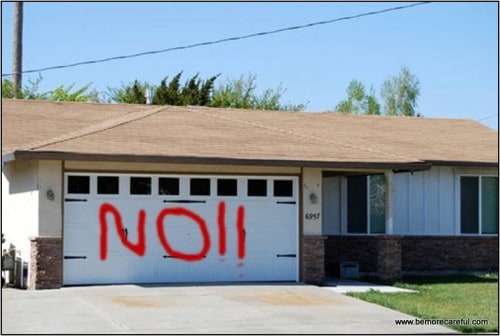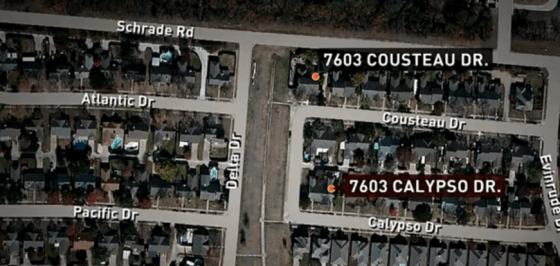 Today's Throwback Thursday looks back to an article from April 2010:
Today's Throwback Thursday looks back to an article from April 2010:
Should Have Posted a “Caution: Don't Knock Our House Down” Sign?
A house in Denton, Texas (not far from where I now live in the DFW area) was knocked down BY MISTAKE. Let that sink in… a company got the wrong house.
And you think “wrong site surgeries” are bad in healthcare? Well, they are. I guess knocking down the wrong house harms a person and their life in a different way than getting the wrong surgery or the wrong site operated on.
I've written before about pathology mixups — where two patients get their specimens swapped in the lab. And what usually happens is a patient is told they have cancer when they really don't, only to have surgery and THEN find out it's not cancer. This mixup screws up two patients' lives, of course.
You can see all of my posts on pathology mixups, including this one:
This Will Happen Again, Unless…
I wrote about how these errors will keep occurring at different hospitals and different labs… with different medical professionals involved. Why? Because the problem is “bad systems” not “bad apples.” Blaming and punishing one employee doesn't fix the system… and that doesn't create learning that prevents future errors.
When I wrote about the 2010 “wrong house” incident, I suggested this as error proofing… if you know a house is going to be demolished in your neighborhood, you maybe need to do this:
So, what did I see in the new yesterday?
Another wrong house demolition case!
Demo company tears down the wrong house
This time it was Rowlett, Texas — also in the DFW. No Texas jokes please.
News video:
What happened?
The company got the right house number… but the wrong street. Both street names start with “C.” I guess, unlike the best practice in healthcare, the demolition team didn't use two separate identifiers for the house?
The “wrong house” had been damaged by a tornado… as the “right house” had been. But the owners had planned to make repairs… not have it demolished.
It's sort of like waking up to find out your tooth got pulled instead of having a filling done.
Talk about bad luck upon bad luck for that homeowner…
The homeowner (a woman with a young son) asked:
“How do you make a mistake like this?” Diaz asked. ” I mean, this is just the worst.”
Asking “how did this happen?” or “why did this happen?” is a good start. Not “who screwed up?” but “what went wrong?”
A demolition company supervisor said that their crew “misread the demolition address.”
That sounds like blaming language to me. What's the role of the supervisor and the company to have better processes? To train better?
I know it's VERY easy to say, in a case like this, something like, “That's such a simple mistake, what dummy could screw that up?”
Again, please no Texas jokes.
It's also easy to say, “See… it's human error. What can you do about human error?” Well, you can have better systems, processes, checklists, and the like. Human error isn't an excuse to hide behind. It's a reality that we need to mitigate. That's the Lean principle of “error proofing” and it's the thinking behind checklists in the cockpit and the operating room.
The company told the homeowner, “It was their first mistake.”
So, at least it wasn't the same company making both mistakes, in Denton and Rowlett.
I wonder how much “investigation” they will do? Or just blame, punish, and move on?
“The Nabors [demolition company] employee later texted photos from Google Maps that shows the arrow for 7601 Cousteau pointing at Diaz and Cutter's duplex a block away.”
Was there a Google Maps error? It worked fine for me when I just tried it. Did somebody create a map (using a Google Maps screenshot?) pointing to the wrong place? Did the demolition team have too much faith in that map, following it blindly without looking at street signs? Is it similar to a surgeon not questioning an X-ray that's been reversed? Since houses and streets in America (unlike Japan) have very standardized addresses, why not rely on GPS instead
I do appreciate the spirit of the homeowner who — after being hit by a tornado AND having her place knocked down — could still have the strength to say, “Maybe it's a blessing?”
What are the lessons learned here? Does each demolition company have to make this mistake before they can learn? Can we be more prepared and have better prevention than telling our employees to “be more careful?”
What are the lessons for hospitals? Manufacturers? Software developers?
Please scroll down (or click) to post a comment. Connect with me on LinkedIn.
Let’s work together to build a culture of continuous improvement and psychological safety. If you're a leader looking to create lasting change—not just projects—I help organizations:
- Engage people at all levels in sustainable improvement
- Shift from fear of mistakes to learning from them
- Apply Lean thinking in practical, people-centered ways
Interested in coaching or a keynote talk? Let’s start a conversation.












What a tragedy! I wonder if the demolition company is going to implement a two person independent verification before demo in the future?
I wrote about the opposite of this a few years ago. Instead of tearing down a house on the wrong lot, they built a house on a wrong lot. It takes a day or so to knock a house down, but building a house takes a lot of time and multiple inspections.
Even with a two-person verification, there is a risk that they are BOTH wrong.
It seems that in this day and age, personal accountability is nearly zero in many work environments. But who can blame them when everything is ‘hurry, hurry, hurry’ and ‘do more with less’. People develop their own “shortcuts” to doing things to be faster: we tend to not ask questions when there is doubt because it takes more time to investigate the answer. I like the saying “take your time and do it right the first time” but it’s too bad that it would probably ‘take too long’.
I think the company that employees the people should be accountable. You’re right that it’s hard to be personally or individually accountable for quality when you’re under “hurry, hurry, hurry” pressure. I think that’s true in this scenario, or in factories, or in hospitals.
Companies have to make sure people aren’t pressured into cutting corners on quality or safety (see my blog post from yesterday on safety).